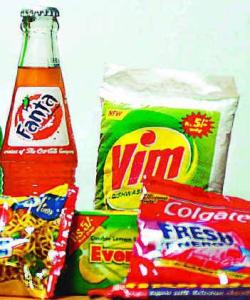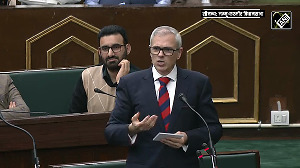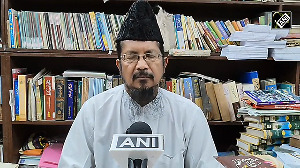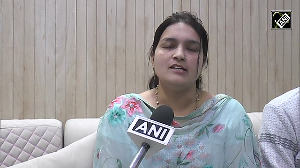 With the rural segment accounting for 60 per cent of sales for fast moving consumer goods companies and 40-50 per cent for consumer durables manufacturers, the government's admission of sowing having fallen almost 20 per cent due to the weak monsoon, and declaring 161 districts as drought-prone, has put these sectors under a cloud.
With the rural segment accounting for 60 per cent of sales for fast moving consumer goods companies and 40-50 per cent for consumer durables manufacturers, the government's admission of sowing having fallen almost 20 per cent due to the weak monsoon, and declaring 161 districts as drought-prone, has put these sectors under a cloud.
They are, however, adopting a 'wait-and-watch' attitude before taking a decision on raising product prices.
The rural segment accounts for almost 50 per cent of the revenue of Hindustan Unilever and Dabur. Companies like Emami, Cavinkare and Colgate derive between 35 and 45 per cent of their revenues from the rural sector. Marico and ITC have the lowest exposure, at 22-25 per cent.
The FMCG sector, as a whole, has a turnover of Rs 100,000 crore (Rs 1,000 billion), which includes feeder supply from wholesalers in urban India to tertiary markets.
Weak rainfall during the peak sowing season (June-July) for kharif crops is bound to put pressure on the incomes of rural households. Rural India also contributes close to 60 per cent of overall sales of the Rs 5,000 crore (Rs 50 billion) packaged goods industry.
"Weak monsoons definitely impact FMCG and consumer durables companies. The profitability and margins of FMCG companies will get affected as input costs will go up.
Sugar is already at a 28-year high in international markets and foodgrain and milk-based industry outputs will also see a pressure," said Anand Ramanathan, FMCG sector analyst with KPMG Advisory Services.
For durables companies, the festive season accounts for 35-40 per cent of the overall sales. "With weak monsoons, there will be an impact on consumer spends across rural and urban India. The top-line of companies in this sector will be impacted," observed Ramnathan.
Emami Group director Aditya Agarwal said: "Bad monsoons would affect consumption and would push up raw material prices. However, we are not going to increase prices of our personal care or food products in the short-term, because there would be a loss of demand and consumption as well."
"Emami may not be impacted because we are not into premium products. Also, there has been moderate rainfall in Orissa, Bengal, Tamil Nadu, Karnataka, parts of Maharashtra and Gujarat. So, in the near term there may not be much of an impact," he added.
Godrej Consumer Products vice-chairman H K Press is also not worried as yet. "Deficient rainfall will have a limited impact on FMCG companies, as consumer spends will not be impacted," he said. The reason, he says, is the rural economy's dependency on monsoons has fallen over the years as government spending on schemes like National Rural Employment Gurantee Scheme and even irrigation and infrastructure projects has increased.
The consumer durables and electronics industry are a hopeful lot, too, although they anticipate a drop in rural and semi-urban consumption if a drought situation arises.
"Around 20 per cent of our revenues come from semi-urban India. This segment may see a dip in consumption if there is a crop loss. In the last six months, our sales grew 30 per cent over the corresponding previous (period)," said a Samsung Electronics spokesperson.
"The impact of drought on the consumer durables industry may show up in the fourth quarter," said Godrej & Boyce Vice-President, marketing, Kamal Nandi.
"Shortage of rainfall will hit agriculture-driven states more than services-driven states. With the festive season round the corner, we are not looking at increasing prices of any of our products immediately, although the impact may be felt after the harvest season, in early 2010," he added.
Whirlpool Vice-President, corporate affairs and strategy, South Asia Shantanu Das Gupta said there may be some impact on festive season sales in small towns, as these towns would be dependent on agri outputs.
However, the consumer durables industry is largely urban in nature, with over 60 per cent of the markets concentrated in towns that have a 0.5 million and more population. Consumer confidence in these towns is growing month on month due to two reasons: the removal of the 10 per per cent surcharge on income-tax for salaried people earning Rs 10 lakh and above in a year, and the second installment of the arrears of the pay commission.
Agriculture decides rural India's fate every three to four months, depending upon weather conditions and market prices. However, there's some solace in the fact that farmers are not just farmers today, notes a recent Reliance Equities research report.
They are diversifying into other businesses for their daily bread: selling buffalo milk, working as labourers on other people's land, taking jobs in the NREGS or other places.
Only 40 per cent of income is agri-based in the hinterland and farmers are often multi-tasking and entrepreneurial in nature. Labour forms 35 per cent of the occupation break-up and rich farmers are also becoming real estate barons.
So, despite the weak monsoon, there could be a silver lining in the cloud for FMCG and consumer durables firms, besides the economy at large.







 © 2025
© 2025